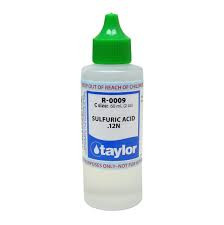Product Description
Taylor Sulfuric Acid .12N - 2oz Dropper Bottle

Maintaining pristine pool water starts with precise testing, and Taylor Sulfuric Acid 0.12N is here to deliver exceptional reliability. Specially designed for use in professional and at-home pool water testing kits, this acid is used for determining total alkalinity in acid demand tests and as an acid indicator in total alkalinity tests.
The "0.12N" or "12N" (same concentration) indicates its normality, which is a measure of its concentration in terms of reactive species (H+ ions in this case).
Usage:
Water Testing: Sulfuric acid, 0.12N, is a key reagent in pool and spa water testing kits, particularly for determining total alkalinity.
Total Alkalinity: It's used to neutralize the alkaline components in the water sample, allowing for accurate measurement of alkalinity.
Water Balance: Accurate alkalinity measurement is essential for maintaining the correct chemical balance of pool and spa water, which helps prevent corrosion of equipment.
While a diluted solution, it's still a corrosive acid and should be handled with care. Always follow the manufacturer's instructions and safety precautions. Proper storage is important for maintaining the reagent's stability. This includes storing it at a consistent temperature, away from direct sunlight and extreme temperatures, and ensuring the cap is tightly sealed to prevent air and humidity exposure.
Sulfuric acid plays a critical role in various applications, particularly in maintaining water chemistry for pools and spas. When used correctly and in appropriate amounts, it effectively lowers pH levels, ensuring the water remains balanced and safe for use. However, it is important to handle sulfuric acid with care, as it is a highly corrosive substance. Proper storage, protective equipment, and adherence to safety guidelines are essential to mitigate risks. By understanding its properties and function, users can leverage sulfuric acid as a valuable tool in water management while prioritizing safety at all times. Happy Swimming!
 Canadian Dollars
Canadian Dollars
 US Dollar
US Dollar
 Euro
Euro








